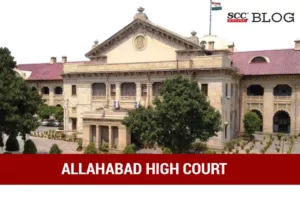Allahabad High Court: In a writ petition filed against the order, wherein the State Government, in exercise of powers under Section 41(3) of the U.P. Urban Planning & Development Act, 1973 (‘the Act, 1973’), has remanded the matter to the Allahabad Development Authority with a direction to dispose of the compounding map submitted by the revisionist in 2005, after providing opportunity of hearing to all the parties and in the light of Rules, Bye-laws and Government Orders relating to compounding, Kshitij Shailendra, J. held that the impugned order is unsustainable and contrary to factual and legal position well established on record.
The petitioner has also claimed quashing of all proceedings pursuant to the application filed by the respondent 5 for compounding of unauthorized constructions with a further prayer to direct the Development Authority to demolish the unauthorized constructions allegedly raised by the respondent 5 over the petitioner’s plot.
The issue was whether the compounding of constructions raised by the respondent 5 can be considered pursuant to the order of remand and as to whether order of remand is in accordance with law.
The Court said that the Act of 1973 does not contain any provision for compounding of constructions. However, there is a provision for composition of offences under Section 32 of the Act 1973. The offences arising out of unlawful or unauthorized constructions are described in Section 26 of the Act-1973. Further there is a provision of realisation of fine as per Section 31 of the Act, 1973. Therefore, the offences which can be compounded are the offences of prosecution/fine and there is no provision, under which, unauthorized constructions can be compounded at least under the Act. However, it is clear that even in the Byelaws of 2009, the word “constructions” has not been mentioned, rather the word “offence” has been used, meaning thereby, that even the Byelaws speak of composition of “offences” and not compounding of “constructions”.
Thus, the Court found that there is no provision under the Act, 1973 which entitles the Authority to profit from an illegal act of encroachment or unauthorized construction in the name of compounding. The compounding contemplated in Section 32 is certainly in respect of offences punishable under the Act. It nowhere provides that once an offence is compounded, an act which is in violation of Plan, shall also stand regularized or become valid. The compounding under the Act, 1973 is to avoid the criminal liability and punishment on conviction, but not to regularise a construction prohibited under the Act for which no relaxation is permissible except when the plan is amended in accordance with Section 13 of the Act.
The Court noted that the Commissioner, in an order held the constructions raised by respondent 5 as unauthorized, illegal and contrary to law and the said order, though challenged by means of writ petition, but the challenge failed and then order passed by the Commissioner on review was further set aside by this Court and was not interfered with by the Supreme Court. The Court said that the effect of these orders cannot be ignored on whether the order impugned is an order on merit or simply an order of remand.
Further, the Court took note of Dr. Santosh Dixit v. State of U.P., 2017 (3) ADJ 401 (DB), wherein it has elaborately dealt with the issue of compounding of unauthorized constructions. It has been held that the violators of the law cannot benefit under the garb of something which the law does not permit. It has also been held that a deviation or violation from a scheme or plan cannot be made a means of profit by collecting huge amounts from offenders/ violators and permitting them to continue to enjoy such deviation. The Court said that if a statute is being read in a manner so as to confer an immunity upon the resourceful people to violate law and permit them to continue to enjoy such violation for all times not only encourage corruption but would also create two classes; one those who are bound to suffer in their efforts of making any deviation from master plan since they lack financial resources to pay the so called compounding fees for continuing to enjoy the illegal and unlawful deviation and, those who are rich, resourceful and capable to do so.
Concerning the submission of the Development Authority that there is no title dispute in between the petitioner and respondent 5 and, therefore, the land over which, the constructions have been raised is not “disputed”, the Court while rejecting the same, said that considering the entire Scheme of the Act 1973 and even Bye-laws of 2009,the word “disputed” has to be understood as per its soul and intent and not to be misunderstood by the one which is engaging the attention of civil/revenue court or which may become a subject matter of such litigation.
On the direction of remand, the Court said that the Development Authority, being sub-ordinate to the State Government, as per the Scheme of 1973, would take up the matter of compounding of constructions and would deal with the same in one or the other way and such a decision would give rise to further rounds of litigation by either side. This Court and the Supreme Court has also, time and again, held that judicial/quasi-judicial authorities should avoid unnecessary remand, therefore, whenever it is found that remand is factually and/or legally unlawful and illegal, the same should be interfered with.
[DB Kauser v State of UP, 2023 SCC OnLine All 178, Order dated 10-05-2023]
Advocates who appeared in this case :
Counsel for Petitioner:- Advocate Rollie Kausar, Advocate Ravi Kant, Senior Advocate Seema Aggarwal;
Counsel for Respondent:- Chief Standing Counsel HP Singh, Nisheeth Yadav, Advocate Prakash Chandra Srivastav, Advocate Sriprakash Singh.

